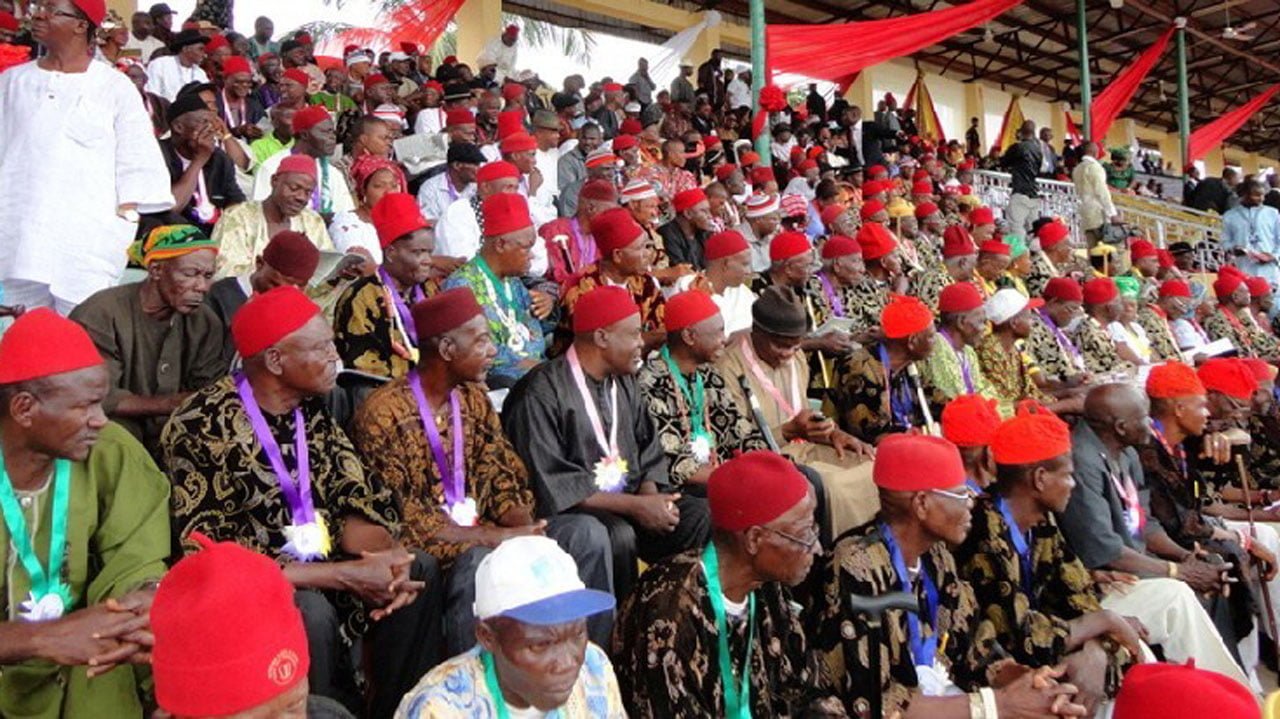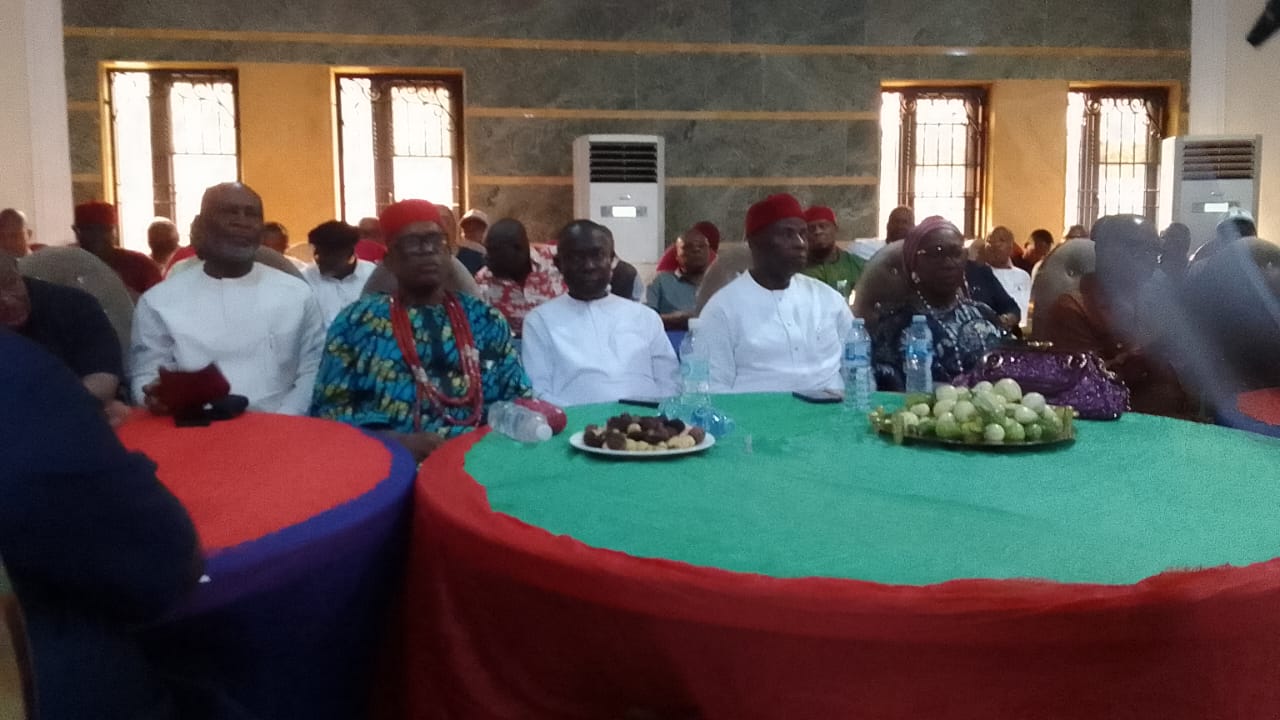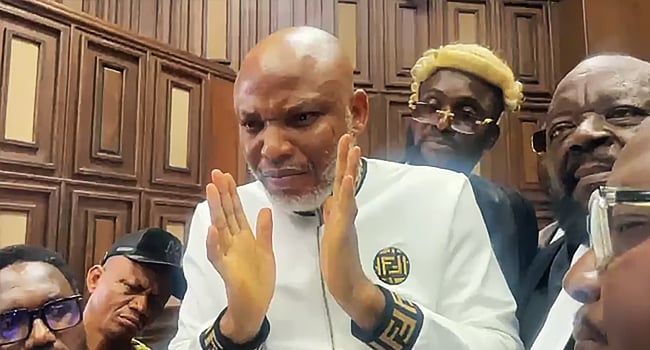The Federal High Court in Abuja on Thursday delivered a sweeping judgment against the detained leader of the Indigenous People of Biafra (IPOB), Nnamdi Kanu, convicting him on all seven terrorism-related charges brought by the Federal Government and sentencing him to life imprisonment.
The proceedings, presided over by Justice James Omotosho, marked a dramatic turn in Kanu’s decade-long legal battle, with the court ruling that his series of broadcasts, separatist directives, and alleged threats against Nigeria and foreign missions amounted to acts of terrorism under Nigerian law.
Court Finds Kanu Guilty of Terrorism, Incitement, and Unlawful Broadcasts
Justice Omotosho held that the prosecution had successfully proved its case using video evidence, audio recordings, and testimonies showing that Kanu repeatedly issued threats of violence, called for attacks on Nigeria’s security forces, and enforced sit-at-home orders across the South-East.
The court found him guilty of:
Inciting violence and killings through regular broadcasts (counts 1 & 2),
Role in violent escalations during the #EndSARS protests, which resulted in the deaths of security personnel and destruction of public property (counts 4 & 5),
Membership of a proscribed terrorist organisation — IPOB (count 3),
Unlawful importation of a radio transmitter used for Radio Biafra broadcasts (count 7).
The judge noted that Kanu’s fiery declarations, including threats that Nigeria would “perish,” and his enforcement of sit-at-home orders which shut down businesses, schools, worship centres, and farms in the South-East, constituted acts “subversive to the Nigerian state.”
Quoting the defendant, the judge cited one broadcast where Kanu warned residents not to open their shops:
“If you do that, we will burn you in that shop.”
Justice Omotosho ruled that such threats “created an atmosphere of terror and compelled widespread compliance through fear.”
Life Imprisonment Handed Down Despite Availability of Death Penalty
Although terrorism offences under Nigerian law can attract the death sentence, Justice Omotosho said he opted for life imprisonment, invoking what he described as “Christian principles of mercy.”
He sentenced Kanu as follows:
Life imprisonment — counts 1, 2, 4, 5, 6.
20 years’ imprisonment — count 3 (membership of a proscribed group).
5 years’ imprisonment — count 7 (unlawful importation of a transmitter).
All sentences will run concurrently, meaning Kanu will serve life imprisonment.
The court also ordered:
Protective custody in a secure facility, not Kuje Prison, due to security risks.
No access to digital devices.
Forfeiture of the imported transmitter to the Federal Government.
Judge Declares Kanu an “International Terrorist” Over Threats to US, UK Missions
In one of the most striking parts of the judgment, Justice Omotosho branded Kanu “an international terrorist”, citing evidence that he issued threats against the United States Embassy, the British High Commission, and former UK High Commissioner to Nigeria, Catriona Laing.
According to the court, Kanu’s threats, as well as instructions urging his followers to manufacture Molotov cocktails and attack security convoys, could have triggered a major diplomatic crisis.
Quoting one broadcast from October 21, 2020, the judge read where Kanu urged IPOB supporters:
“Wherever you see a military convoy, you attack them. Whenever you see a police convoy, attack them. They also bleed. Anyone in uniform is your enemy.”
Justice Omotosho said threats against internationally protected persons, such as ambassadors, fall under offences punishable by life imprisonment and further justified Kanu’s conviction.
Fair Hearing Not Violated, Court Rules
Addressing Kanu’s long-standing claim that he was denied a fair hearing, the court ruled that the IPOB leader “had every opportunity to defend himself” and that his complaint of extraordinary rendition did not invalidate the charges before the court.
Justice Omotosho said he reviewed the case from 2015 and found the defendant had “consistently exhibited unruly conduct” in and out of court.
Background: Arrest, Rendition, and Prolonged Detention
Kanu has been in the custody of the Department of State Services (DSS) since June 2021, when he was rearrested abroad in a controversial operation still being challenged by his lawyers. His trial has spanned multiple adjournments, constitutional arguments, and appeals to both domestic and international bodies.
The IPOB leader faces additional charges at the appellate level and has maintained that his agitation for Biafra is legitimate and protected under international law.
Thursday’s ruling represents one of the most consequential terrorism judgments in Nigeria’s recent history, with wide-ranging political and security implications for the South-East region, where IPOB maintains influence.
The Federal Government has yet to issue a formal reaction as of press time, while Kanu’s legal team is expected to challenge the judgment at the Court of Appeal.













